77 Nerdfighteria: A Civic and Politicized Fandom
Mara Di Persio
John and Hank Green are widely known as successful and respected authors, vloggers, educators, and philanthropists. After their YouTube channel accumulated a significant number of subscribers and a dedicated following, the brothers went on to pursue other endeavors beyond the video platform. Their shared interests in traditionally nerdy pursuits led to the brothers dubbing their fanbase Nerdfighters, who constitute the fandom of Nerdfighteria. While the name might suggest a disdain towards nerds and all things related, this community is precisely the opposite. Nerdfighteria is an especially interesting case because John and Hank Green have leveraged the fanbase toward charitable pursuits outside of their original objects of affection. The current study aims to investigate Nerdfighteria’s use of memes on X.com to fight against various corporations who play major roles in the accessibility of tuberculosis treatments and equipment. In doing so, the emotional and psychological factors that have caused the fandom to become so politicized and civically engaged will be revealed.
The origins of the Nerdfighteria fandom can be traced back to 2007, when John and Hank Green developed a project called Brotherhood 2.0 on YouTube. The brothers decided to communicate with each other exclusively through videos addressed to each other, which were also posted online for others to watch (WBUR, 2015). As the channel started to amass a following, the Greens started posting a wide variety of content that established their image as “nerdy” or “goofy.” The brothers doled out challenges to each other if they accidentally exceeded the time limits on their videos or communicated through means aside from YouTube, such as waxing their chins or spending a full day in Target. As a fourteen-year-old, I vividly remember laughing to the point of tears while watching John cover his face in sharpie or peanut butter in Q&A videos. Hank wrote and played the instrumentals for original songs about other fan-objects like the Harry Potter series, including one called Accio Deathly Hallows that went viral (WBUR, 2015). After a while, they decided to establish their fanbase as the Nerdfighters, who “… instead of being made out of, like, bones and skin and tissue [are] made entirely of awesome” (vlogbrothers, 2009).
Several years of garnering subscribers and viewership on YouTube led to other opportunities outside of the platform. John and Hank Green went on to co-found VidCon, an annual online video conference celebrating digital content creators, brands, and fans. They also launched other YouTube channels dedicated to sharing free educational videos, including CrashCourse and SciShow. Hank released five studio albums about science and nerd culture, releasing songs like Strange Charm: A Song about Quarks and performing at concerts with various guest bands. He even interviewed United States President Barack Obama as part of a YouTube project allowing a few the platform’s content creators ask questions about social issues (WBUR, 2015). By sharing their status as fans of other texts and media objects, John and Hank were able garner fans of their own, who shared their interests and openly expressed them.
It is important to understand the historical context in which vlogbrothers rose to internet fame and Nerdfighteria came to fruition. The Green brothers started their YouTube channel at a time when fans were no longer seen as marginalized groups looking to fight their negative representations and establish their own voice. Rather, they were becoming more engaged with mainstream culture and embraced their identities as fans. This second wave of fandom was characterized by empowerment and widespread acceptance. The invention of YouTube signified a wider phenomenon in which participatory cultures were becoming normalized and more easily accessible (Gray et al., 2007, 5). Participatory cultures are described as spaces in which fans can affectively react to media by creating their own material in relation to them (O’Boyle, 2022, 154). Also known as produsers, these fans not only consume content from the vlogbrothers channel but send in their own related creations (O’Boyle, 2022, 154) in the form of videos, artwork, clothes, and more. Blending the roles of producers and consumers is part of what makes Nerdfighteria feel like a community and gives viewers creative agency to participate in a way that is meaningful to them (O’Boyle, 2022, 154). YouTube was one of several new platforms that came with the rise of the internet and allowed users to interact online and publish their own content (Broersma, 2019, 1). The integration of social media platforms has only increased their visibility and helped them reach larger and more diverse audiences (Jenkins, 2018, 14). Recognizing that they have an active fan-base that possesses cultural power, the brothers have shifted their focus towards becoming more activist. Their mission is to become more socially productive and utilize their fandom to create a more humane society, reflecting the characteristics of the third wave of fandom (Gray et al., 2007, 7).
Across the years, John and Hank have spearheaded numerous charity events and philanthropic organizations. Project For Awesome is a 48-hour livestream event that donates 100% of the funds raised to various charities. Pizzamas is an annual internet holiday lasting two weeks and involves the brothers posting YouTube videos every weekday, a nod to their posting schedule back in 2007. Independent artists contribute designs for limited-edition merchandise with the profits going towards organizations like Partners in Health. The Awesome Socks Club and Awesome Coffee Club provide monthly or bi-weekly ethically sourced gift packages to subscribers to support laborers in underdeveloped countries (Wurst, 2023). Nerdfighteria has raised tens of millions of dollars to help build The Maternal Center of Excellence, a maternal hospital in Sierra Leone helping to improve infant and maternal mortality rates (Baker, 2023). Their activist pursuits seem endless, and the fandom is embarking on their most ambitious project yet: increasing access to tuberculosis testing and treatment. Critical theory suggests that brands and businesses value affective and immaterial labor for monetary gain (Jenkins, 2018, 22), this does not seem to be the case with Nerdfighteria. John and Hank Green do not profit from these projects, donating 100% of funds to charities.
The current goal is to raise awareness to the current cases of tuberculosis that have overtaken impoverished countries. It is a common misconception that the disease was eradicated decades ago, as it is one of the most infectious killers (Shotwell, 2023) and the 13th leading cause of death in the world, killing around 1.6 million people every year (Beattie-Zarb, 2023). In July 2023, John posted an open letter in the form of a YouTube video asking Johnson & Johnson to release their patent for bedaquiline, the leading drug in fighting the disease. He informed viewers that renewing their extension on the patents would prevent approximately 6 million people from surviving TB and encouraged Nerdfighters to contact the company. The fandom took to action immediately, making phone calls, sending emails, and posting comments and tweets addressing Johnson & Johnson’s hoarding of the drug. Some sections of their website had to be shut down since there was an overload of traffic and a massive influx of requests. Within 24 hours, the company had granted Stop TB Partnership a license to create and distribute bedaquiline generics, making it accessible to countries outside of Eastern Europe and Asia (Shotwell, 2023).
A few months ago, the fandom’s most recent call to collective action took place when John called out biotech companies Danaher and Cepheid, which were price-gauging their tuberculosis testing equipment. He informed his audience that their GeneXpert tests could quickly and accurately provide TB diagnoses, but the single-use cartridges were priced between $10 and $15 in US dollars, which is a 200-500% markup. John made viewers aware of these numbers and made a similar request for Nerdfighters to spread awareness about the issue. Once again, the fandom was quick to post about their outrage online. Although this is still an ongoing battle, Nerdfighteria produced a large number of memes and posts addressing the controversial hoarding of medical equipment (Beattie-Zarb, 2023). The purpose of this case study is to examine the related fan creations that were shared among the fandom in response to John Green’s call to action. Although there was lots of content shared to various platforms, the focus will be placed on the memes and comments shared to X.com.
Figure 1
Example of Nerdfighter meme posted in response to Danaher and Cepheid controversy
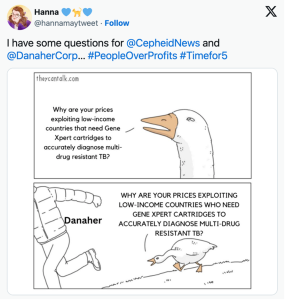
Figure 2
Example of Nerdfighter meme posted in response to Danaher and Cepheid controversy
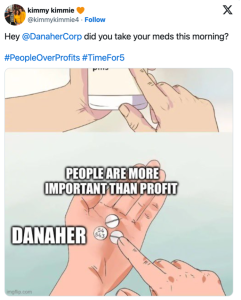
Figure 3
Example of Nerdfighter meme posted in response to Danaher and Cepheid controversy
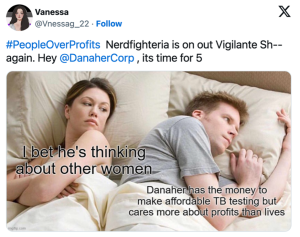
Figure 4
Example of Nerdfighter meme posted in response to Danaher and Cepheid controversy
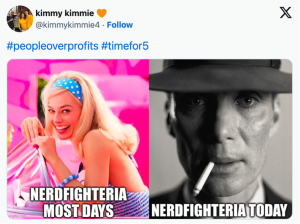
Figure 5
Example of Nerdfighter meme posted in response to Danaher and Cepheid controversy
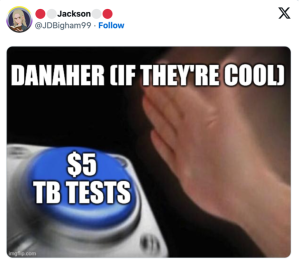
These posts use popular meme formats that have been modified by Nerdfighters to fit into the discourse surrounding Danaher and Cepheid’s role in determining accessibility to GeneXpert testing machines. Most posts used the hashtag #PeopleOverProfit and even tagged the official account for the Danaher Corporation (Baker, 2023). The use of hashtag activism proved to be effective in garnering public support. Despite lacking institutional structures, hashtags allow users to participate in the public sphere and are an affective practice made possible through networked technologies (Lunenborg, 2019, 325) like X.com. Some fans opted to craft their own personal statements instead, which were particularly sobering and powerful. One user draws attention to the irony that a curable disease claims so many lives each year, stating that “… six people died from it in the time that it took [her] to write this tweet” (Baker, 2023).
Although Nerdfighteria does regularly engage in political discussions, it would be more accurate to describe the fandom as politicized. Fans can become politicized when their object of affection takes on a certain stance in a political matter (Dean, 2017, 410). In this case, the Nerdfighters are aligning themselves with John’s view that profit-driven corporations exemplify systemic oppression and dehumanize vulnerable people. Dean (2017, 411-415) outlines several features of politicized fandoms that are evident in Nerdfighteria’s response to Danaher and the tuberculosis epidemic as a whole. First, a politicized fandom exhibits productivity and consumption as a form of socially produced reciprocity. In other words, they produce their own texts as well as consuming those made by others within the community or the fan object itself. After watching John Green’s videos and reading his posts on social media, Nerdfighters recirculated this content and contributed their own creations. Next, politicized fandoms experience affect in the form of an emotional connection to the ideology or figure that is maintained over time. Nerdfighteria initially became politically mobilized to address issues surrounding tuberculosis in July of this year when John asked his fans to reach out to Johnson & Johnson. Their support continued for several months and was utilized again to battle Danaher and Cepheid. This also reflects a shift in the direction of affective flow, which is now being projected outside of the fandom instead of between fans and the fan object. Additionally, a sense of community is essential for the development of mutual support within politicized fandoms. Despite the inability to meet all other Nerdfighters in-person, these fans still feel comradery with other fans since they can communicate online, typically in the comment sections of YouTube videos and other posts on social media. Their interconnectedness and support for one another reveals their belief that they are part of a community that opposes dominant social norms, specifically our society’s endless growth economy and the tendency for major corporations to withhold medical supplies from those in need to make a profit. Lastly, contesting injustices and attempting to change our social structures is required for fandoms to become politicized. Nerdfighters are working together to make a difference in the accessibility of TB treatments, a sociopolitical change that would have a positive impact on future society (Dean, 2017, 415).
Perhaps the best way to think of Nerdfighteria is to view it as a civic fandom. The term implies that these audiences participate in the public life by pursuing public good, thus becoming politically engaged (Jenkins et al., 2020, 6). Similarly, fan-based citizenship suggests that fans of media texts can engage with the public in ways that blend with their commitment to their object of affection (Hinck, 2019, 6). In this case, the Nerdfighters are fans of science, literature, and other geeky domains, as well as Hank and John Green themselves. Their devotion to this community has allowed them to fight for TB treatment access in the name of Nerdfighteria. Dalgren’s six dimensions of civic culture (Jenkins et al., 2020, 6-7) are apparent in the Nerdfighters’ responses to the tuberculosis crisis. At its core, the fandom shares values of kindness and generosity above all else. John and Hank have reiterated on many occasions that their desire to go beyond fandom and elicit tangible change reflects the heart of the community (Baker, 2023). The motive behind the #PeopleOverProfits movement was to bring this sense of community to those who are facing injustices at the hands of an oppressive system. Their affinity or shared interest for social justice in general mobilized them to take up the cause, leading to a shared identity based in being a caring person. The Nerdfighters were able to harness their newfound knowledge of the systemic issues surrounding diagnoses and treatments for TB, using it to get the word out through their own social media platforms. More broadly, the community is constantly using their skills to create meaningful and impactful content as it relates to the fandom. As an example, Alys Jones is an artist and illustrator that has been a member of Nerdfighteria for more than ten years. As part of her own fundraising project to contribute to Partners in Health, she wrote and designed a children’s book that is all about being a Nerdfighter and the positive traits associated with the title. John responded to the initiative himself, saying that it was a wonderful gesture (Baker, 2023). This shows one of the ways in which civic fandoms tap into the skills of their members to become politically engaged. Posting memes and recirculating the creations of others fosters discussion surrounding the problem and raises awareness for TB, a disease that has been shrouded with misunderstandings (Jenkins et al., 2020, 7).
Possibly the most defining aspect of the Nerdfighter community is their civic imagination. Defined as the “… capacity to imagine alternatives to current cultural, social, political, or economic conditions” (Jenkins et al., 2020, 5), this is a key trait that pushes Nerdfighteria to embark on philanthropic projects and work with charitable organizations like Stop TB and Partners in Health. The fandom has imagined a better world in which nobody is prevented from receiving the medial help they need and see themselves as civic agents who can make this a reality (Jenkins, 2020, 5). The Nerdfighters go beyond fan activism and participate in advocacy journalism, advocating on behalf of disadvantaged groups (O’Boyle, 2022, 154). John and Hank Green have flown to Sierra Leone to visit tuberculosis hospitals and recorded the positive effects that fundraising money has been having, which are then posted as videos on YouTube (vlogbrothers, 2023). Watching these videos increases viewers’ understanding of what is happening in other parts of the world and reinforces the idea that their efforts are making a difference. Many Nerdfighters are civic storytellers as well, posting or commenting their own stories related to the topics of discussion in Vlogbrother videos to share them with the rest of the community (O’Boyle, 2022, 154).
To conclude, it has been found that Nerdfighteria is a highly politicized and civic fandom. John and Hank Green managed to foster a strong sense of community by expressing their interests online, and then encouraging others to share their own meaningful creations relating to those media texts. Embracing their identities as nerds, developing an affective connection to fan-objects and each other, and being able to interact with each other through the internet fostered a sense of closeness between members, despite never having met each other in real life. Eventually, John and Hank Green had developed a fandom cohesive enough to impose their desires to create social change onto their followers. By projecting values of goodness and empathy toward their audience, they were able to politicize them and mobilize their skills and knowledge towards causes beyond their community. Social media platforms like X.com have connected these grassroots activists even further, allowing them to recirculate each other’s content. Examining the emotional and psychological factors that motivate Nerdfighters to engage with charities and philanthropic projects could have wider implications. While the Green brothers and Nerdfighteria have made great strides in addressing various issues, many people remain uneducated on important events taking place around the world. Perhaps a call for other celebrities, such as entertainers or sports starts, to mobilize their fandoms could improve more people’s intentions to come together and decrease world suck.
References
Baker, K. (2023, June 8). This picture book about Hank & John Green raises funds for charity. Good Good Good. https://www.goodgoodgood.co/articles/nerdfighter-book-hank-john-green
Baker, K. (2023, September 13). 14 best memes about Danaher & TB from John Green &
activists. Good Good Good. https://www.goodgoodgood.co/articles/john-green-danaher-tuberculosis-memes
Beattie-Zarb, K. (2023, September 15). #PeopleOverProfits: The campaign fighting overpriced
tuberculosis healthcare with memes. York Vision. https://www.yorkvision.co.uk/features/peopleoverprofits-the-campaign-fighting-overpriced-tuberculosis-healthcare-with-memes/15/09/2023
Broersma, M. (2019). Audience engagement. The International Encyclopedia of Journalism Studies, 1-6.
Dean, J. (2017). Politicising fandom. The British Journal of Politics and International Relations, 19(2), 408-424.
Gray, J., Sandvoss, C., & Harrington, C. L. (2007). Why still study fans? In Fandom: Identities and communities in a mediated world (2nd ed., pp. 1-7). NYU Press.
Hinck, A. (2019). Politics for the love of fandom: Fan-based citizenship in a digital world. LSU
Press.
Jenkins, H. (2018). Fandom, negotiation, and participatory culture. In P. Booth (ed.), A
companion to media fandom and fan studies (pp. 13-26). Routledge.
Jenkins, H., Peters-Lazaro, G., & Shresthova, S. (Eds.). (2020). Popular culture and the civic
imagination: Case studies of creative social change (pp. 5-7). NYU Press.
Lunenborg, M. (2019). Affective publics: Understanding the dynamic formation of public
articulations beyond the public sphere. In A. Fleig & C. von Scheve (Eds.), Public spheres of resonance: Constellations of affect and language (pp. 325-326). Routledge.
O’Boyle, N. (2022). Produsers: New media audiences and the paradoxes of participatory culture.
In Communication Theory for Humans (pp. 153-181). Palgrave Macmillan.
vlogbrothers (2023, August 15). Henry [Video]. YouTube.
https://youtu.be/JhVJMO0wgTE?feature=shared
vlogbrothers (2009, December 27). How to be a nerdfighter: A Vlogbrothers FAQ [Video].
YouTube. https://youtu.be/FyQi79aYfxU?feature=shared
WBUR (2015, May 1). Video blogger Hank Green fuses punk rock and nerd culture in Cambridge. WBUR Radio Boston. https://www.wbur.org/radioboston/2015/05/01/hank-youtube
Wurst, E. (2023, September 5). Pizzamas: How a bad mustache became an annual fundraiser &
community tradition. Good Good Good. https://www.goodgoodgood.co/articles/pizzamas

